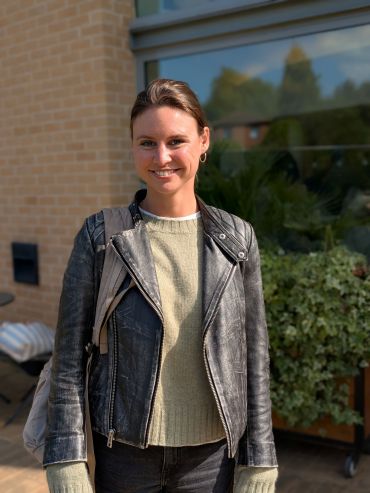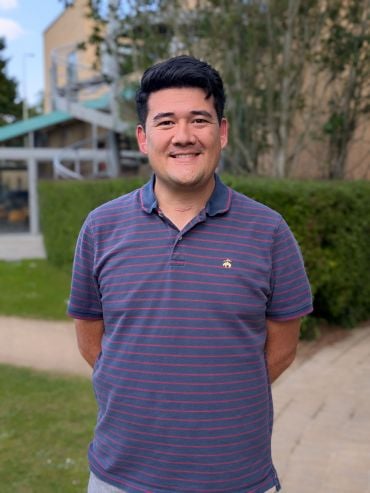
Oxford MBA students explore the science behind wellbeing in a pioneering new elective
A new elective at Oxford University's Saïd Business School (SBS) is placing wellbeing at the heart of business education. Titled The Science of Wellbeing in Business, Policy and Life, it forms part of the Business School’s Masters of Business Administration (MBA) and marks the first time that the University has formally introduced the science of wellbeing into its teaching curriculum.
 Professor Jan-Emmanuel De Neve, Director of the Wellbeing Research Centre at Oxford and Professor of Economics and Behavioural Science at the Saïd Business School
Professor Jan-Emmanuel De Neve, Director of the Wellbeing Research Centre at Oxford and Professor of Economics and Behavioural Science at the Saïd Business School In 2024/25 Oxford's MBA brings together 348 students from 59 countries and industries ranging from finance to healthcare. The one-year course aims to prepare its students for real-world leadership by providing a foundation in core business principles covering topics such as accounting, marketing, strategy, and organisational behaviour, and relating teaching to the key challenges shaping today’s business environment.
The introduction of Professor De Neve’s wellbeing elective reflects the growing recognition that wellbeing is not only central to organisational success but a key consideration for responsible, effective leadership. Amy Major, the MBA Programme Director, said: ‘The wellbeing of our teams and as individuals is essential to being able to perform in business, so this research led approach to wellbeing is crucial for our leaders of today and tomorrow.’
 Kira Vilanek, from Berlin, is one of 85 students who selected the wellbeing elective
Kira Vilanek, from Berlin, is one of 85 students who selected the wellbeing electiveInterest among the MBA cohort was high with demand outstripping the available 85 places – an unusually impressive uptake for a completely new elective course. ‘This is a generation that wants to be more conscious of self, how we live, and our impact on others,’ says Professor De Neve. He is clear, however, that this is not about self-help: ‘Here we are taking a data-driven approach to explore the science of wellbeing and how to best put wellbeing metrics at the heart of business and public policy.’
Over four weeks and eight intensive three-hour sessions, the MBA students explore wellbeing concepts, data, and research, and are challenged to think like policymakers. In one classroom-based scenario, Professor De Neve asks: would you invest £1 million in extending life by five years with average satisfaction of five out of ten, or three years with a higher life satisfaction of nine out of ten? The result is a lively and thought-provoking debate.
Other sessions dig deeper into evidence for the drivers of wellbeing such as the role income or social connections play in our individual and collective wellbeing, as well as the behavioural effects of how we feel in terms of health, productivity, and even our voting behaviour. Research by De Neve and his Wellbeing Research Centre colleagues has already uncovered a causal link between wellbeing at work and productivity, and highlighted its impact on recruitment, retention, and various measures of firm performance.
 MBA student David Catalano says wellbeing is really important to a successful workplace
MBA student David Catalano says wellbeing is really important to a successful workplaceDavid Catalano has temporarily relocated from the United States to Oxford with his young family and having struggled in the past to maintain a healthy work-life balance has since made a conscious effort to reach out to and support colleagues who face similar challenges.
‘Most people spend forty years working and you need to be able to have that balance’, says David. ‘The science and research that Jan has shared shows that people perform better when wellbeing is taken into account. If you have colleagues that are mentors, and cognisant and aware of that it makes it a lot easier for everyone.’
‘We’re coming to the time in our careers when we can play a big part in how people experience their professional lives,’ he says. ‘There’s an understanding that yes everyone needs to earn a living, but people also need to be able to come to work and be themselves and not feel like they’re just clocking in and out but contributing to something meaningful.'
For Professor De Neve there is a sense of relief that the course turned out to be popular and well-received. ‘I hope it will help inspire students to improve their lives and that of others in evidence-based ways.’
Find out more: Why Workplace Wellbeing Matters — Wellbeing Research Centre
Oxford MBA | Saïd Business School
 Intensifying rainfall over South America revealed by new generation of climate model
Intensifying rainfall over South America revealed by new generation of climate model Oxford MBA students explore the science behind wellbeing in a pioneering new elective
Oxford MBA students explore the science behind wellbeing in a pioneering new elective The Oxford programme building interdisciplinary skills for the future
The Oxford programme building interdisciplinary skills for the future  Africa’s change-makers: meet the Mastercard Foundation Scholars with big ambitions for the future
Africa’s change-makers: meet the Mastercard Foundation Scholars with big ambitions for the future A green fuels breakthrough: bio-engineering bacteria to become ‘hydrogen nanoreactors’
A green fuels breakthrough: bio-engineering bacteria to become ‘hydrogen nanoreactors’ Oxford's student voices at COP29
Oxford's student voices at COP29 Teaching the World’s Future Leaders
Teaching the World’s Future Leaders  A blueprint for sustainability: Building new circular battery economies to power the future
A blueprint for sustainability: Building new circular battery economies to power the future Oxford citizen science project helps improve detection of antibiotic resistance
Oxford citizen science project helps improve detection of antibiotic resistance